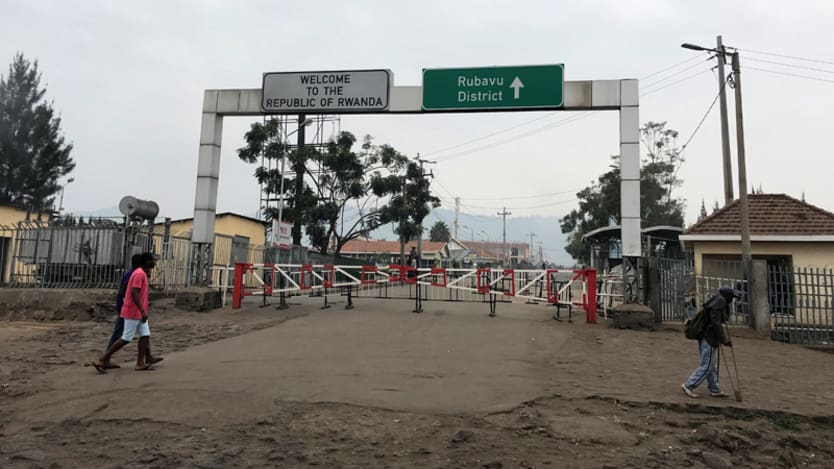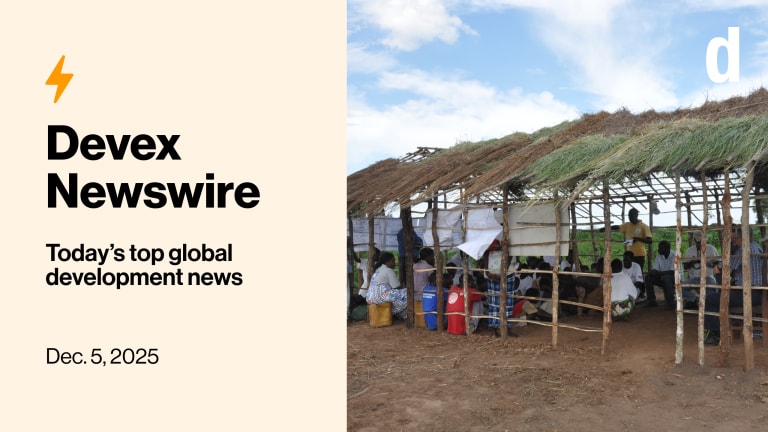
KIGALI, Rwanda — The Rwandan health community was on high alert Thursday after a third case of Ebola was confirmed in the Congolese city of Goma, near the border, with conflicting reports over whether the border had been temporarily closed — a situation many want to avoid.
There have been no Ebola cases in Rwanda so far, but neighboring countries remain prepared for the risk that the outbreak could spread. With over 2,500 cases confirmed and 1,600 deaths, it is the second-largest Ebola outbreak in history.
In what it calls the “pre-epidemic phase,” the Rwanda Red Cross has been conducting simulations with its staff and volunteers — as well as taking part in three national simulations conducted by the Ministry of Health, which included security and humanitarian organizations — to ensure they know what to do should the outbreak spill into Rwanda.
“We are at risk and we need to train more teams, increase the number of awareness sessions so that communities know the risks, and really we need more financial support to build capacity and get prepared.”
— Dyrckx Dushime, president of the Rwanda Red Cross for Rubavu District“We have really increased preparedness and readiness to ensure that the country is free of Ebola, but people cross the border on a daily basis from DRC to Rwanda, especially from Goma city so they are close,” said Dyrckx Dushime, president of the Rwanda Red Cross for Rubavu District, which is considered one of the most at-risk regions given its proximity to Goma. “There is not kilometers but meters between us [and Goma],” explained Dushime.
The objective of the simulations is to test the capacity and capabilities of the organization around logistics, infection prevention and control, case management, screening, and safe burial of suspected Ebola patients. If any gaps are identified, strategies are then developed to address them.
Almost 24,000 health workers have been trained to deal with Ebola in Rwanda, 3,000 health care providers and other frontline workers in 15 high-risk districts have been vaccinated, and an emergency treatment center has been set up in Rubavu district.
Speaking to Devex, Dushime explained why he believes Rwanda is Ebola-ready and what it needs from the international community to keep up the preparedness efforts.
This conversation has been edited for length and clarity.
Do you think Rwanda is prepared for an outbreak of Ebola should it happen?
It is really prepared and we have conducted several preparedness activities — like simulation exercises, training of our response teams, and ensuring that we have personal protective equipment like goggles, aprons, etcetera. Everything is in place in case we have a case. We will be ready to respond accordingly.
Aside from simulations, what other activities are the Rwanda Red Cross conducting to prepare for a potential outbreak?
For the Rwanda Red Cross, it involves three key components.
More Ebola coverage
► Ebola funding increases as crisis worsens
► Breaking: WHO declares global public health emergency in DRC Ebola outbreak
► DRC health minister quits as new president takes over Ebola response
Firstly, we educate the community and sensitize them through public health awareness sessions. We tell them what Ebola is, how it spreads, and what they can do to promote preventive measures. We teach the community that when you have a fever of 38 degrees Celsius, that is one of the first symptoms.
We then teach communities about preventive mechanisms: washing the hands and doing it properly by following the instructions given by the Ministry of Health. We tell them that when they have information about a suspected case, they should call the free toll phone number — 114 — to report the incident.
We also use mobile cinema to educate the community, as well as radio and TV shows. People like watching movies, and when you use cinema they get the message easily, especially the illiterate population.
We talk about the story of Ebola and tell the community to avoid eating bush meat — like fruit bats, monkeys, chimpanzees, and antelope. In Rwanda, it's not common to eat bush meat but we tell them that’s where Ebola [can] start from. We teach them about avoiding human-to-human transmission.
For the second pillar of response, the Red Cross teams have been trained to carry and bury any person who has passed away safely and with dignity.
And thirdly, we are involved in contact tracing. The mobility of people is very tense at the border so in case there is a suspected case of Ebola, we want to follow any person who has had contact with them. We will follow them for a period of 21 days to see if they show any symptoms. If they don’t, they are free to go about their daily business.
How do you get local communities to take part in the activities you’re running?
The Red Cross volunteers are located within the communities so it's easy for us to reach them. When we have such events, we invite the people, but we [also] work hand-in-hand with the local authorities ... Ebola is a concern of each and every one of us in Rwanda.
What more do you think Rwanda, and the international community, need to be doing to ensure its as prepared as it can be?
The Ebola virus in the Democratic Republic of the Congo has been declared a public health emergency so in Rwanda, we need to enhance our preparedness. We are at risk and we need to train more teams, increase the number of awareness sessions so that communities know the risks, and really we need more financial support to build capacity and get prepared.








